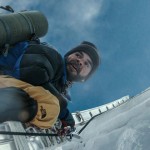Writers and filmmakers know that words and images reach only an approximate truth. Author Jon Krakauer seemed painfully aware of this when chronicling his 1996 expedition to Mount Everest in the best-selling book Into Thin Air: A Personal Account of the Mount Everest Disaster. Eight people from two climbing groups died in twenty-four hours trying to find their way down from the summit in a sudden blizzard, then the deadliest time on the mountain. As he reported and recounted those events, Krakauer cited Joan Didion’s famed quote about the interpretation of reality: “We tell ourselves stories in order to live.”
The film Everest, opening in wide release September 25, reenacts that disastrous trip. Everest isn’t an adaptation of one specific work, and is instead based on interviews with survivors and pulls elements from several books, including Krakauer’s. Jason Clarke and Jake Gyllenhaal star as expedition guides Rob Hall and Scott Fischer, with Josh Brolin and John Hawkes among the climbers. Michael Kelly (TV’s “House of Cards” and Secret in Their Eyes, out in November) plays Krakauer as an audience surrogate who asks why they face such perils. The shoot’s physical demands formed deep friendships among the cast and crew, Kelly has said. “We didn’t climb Everest, but we went through a hell of a lot together.”
So far, reviews of Everest are positive, and praise especially the dizzying cinematography. Some critics wanted more of an emotional connection with the climbers, but Variety was among those impressed by the film’s lack of sentiment: “There is only death and survival here, and the human spirit, it turns out, has little to do with any of it.”
Krakauer has since called his Everest climb “the biggest mistake I’ve ever made in my life” and notes that it haunts him to this day. “I thought that writing the book might purge Everest from my life,” he wrote in Into Thin Air. “It hasn’t, of course.”
Real stories and the authors who become part of them hold such appeal but can lose an essential truth moving from life to page to screen. We salute writers brave enough to share their emotional crucibles, and the actors unafraid to portray them. Today at Word and Film, I present a sampling of those whose skill on the page met with onscreen magic in films such as Wild, Tracks, The Diving Bell and the Butterfly, and The Killing Fields. The latter focuses on the Cambodian reporting of Sydney Schanberg, a wise, kind and witty man I’ve been blessed to call my friend.

